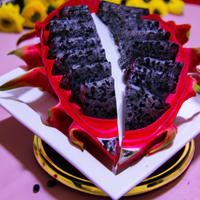
1 serving (100 grams) contains 60 calories, 1.2 grams of protein, 0.4 grams of fat, and 13.0 grams of carbohydrates.

Log this food in SnapCalorie

Nutrition Information
Calories |
142.9 | ||
|---|---|---|---|
% Daily Value* |
|||
| Total Fat | 1.0 g | 1% | |
| Saturated Fat | 0.2 g | 1% | |
| Polyunsaturated Fat | 0 g | ||
| Cholesterol | 0 mg | 0% | |
| Sodium | 0 mg | 0% | |
| Total Carbohydrates | 31.0 g | 11% | |
| Dietary Fiber | 7.1 g | 25% | |
| Sugars | 19.0 g | ||
| protein | 2.9 g | 5% | |
| Vitamin D | 0 mcg | 0% | |
| Calcium | 42.9 mg | 3% | |
| Iron | 1.7 mg | 9% | |
| Potassium | 261.9 mg | 5% | |
* Percent Daily Values are based on a 2,000 calorie diet. Your daily values may be higher or lower depending on your calorie needs.
Food Attributes
Source of Calories
About Dragon fruit slice
Dragon fruit, also known as pitaya, is a tropical fruit native to Central America and now enjoyed globally, particularly in Southeast Asian cuisine. Its vibrant pink or yellow skin and speckled white or red flesh make it as visually striking as it is nutritious. A slice of dragon fruit is rich in antioxidants like vitamin C and beta-carotene, which support immune health and skin vitality. It's also a great source of fiber, promoting digestion and gut health, while being low in calories and naturally fat-free. Additionally, dragon fruit contains magnesium and small amounts of iron, aiding in muscle function and energy production. Its subtly sweet flavor and refreshing texture make it a healthy snack or ingredient for smoothies and salads. However, as with any fruit, it’s important to consume in moderation due to its natural sugar content. Dragon fruit is a delicious, nutrient-packed addition to a balanced diet.



